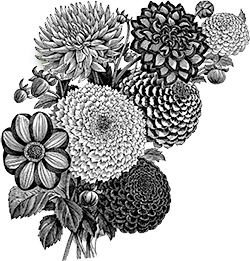A Dutch friend asked me recently, “Are heirloom bulbs different from historical bulbs?” Not really, I told him, but we’d say “historic” instead of “historical” – and then the former English teacher in me kicked into high gear and I gave him my thoughts on other words commonly used to describe older plants:
Historic, not Historical – Although their meanings overlap somewhat, historical usually means “relating to history” while historic means “a part of history.” So a historical novel – a story written ABOUT the past – is not the same as a historic novel – which was written IN the past. Some people say that historic has to refer only to important things in history, but the modern sense of history has changed so much that we no longer think it’s only kings and famous people who are historic. Our house and office, for example, are in the Old West Side Historic District, and thousands of houses across the US are also in historic districts – not historical districts. Universities have programs in Historic Preservation, there’s the Historic Iris Preservation Society, the American Daffodil Society has a section in every show for Historic Pre-1940 Daffodils, etc.
Antique – In America, older varieties of apples are typically called “antique apples.” I don’t know why, but they are. Antique suggests something that’s old but with the added connotation of value or worthiness. People collect antiques, we have antique shops, etc.
Vintage – Although it comes originally from the world of wine, “vintage” is being used more and more often to describe things from the past that aren’t as old – or maybe as serious – as antiques. It’s most often used to describe clothing, but it’s also frequently used for items offered on eBay and Craigslist. It seems to be a word that’s more appealing to younger adults, who may see “antique” as being stuffy or hoity-toity but who appreciate the scruffy, counter-culture look of, say, ragged jeans, and the creative diversity of older things.
Oldies and Old-Timers – The dahlia and gladiolus societies sometimes use these terms, but as much as I like their informal, approachable tone, I think they discount the importance of older varieties. “Oldies,” to me, sounds like something that’s merely quaint and interesting, while “historic,” “heirloom,” and “heritage” sound like something valuable that we ought to take care of and preserve.
Heritage – This is often used in England and Canada to describe historic resources such as buildings, etc. It’s also being applied to plants now. (Ten years ago, “antique flowers” was the common term in England.) It has the sense of something being handed down but with more of a community or national significance rather than just personal or family importance. It’s a term that’s just starting to catch on for buildings and plants here in the US – and I’ve actually been thinking of changing our name from Old House Gardens - Heirloom Bulbs to Old House Gardens - Heritage Bulbs.
Heirloom – This suggests something old that’s often of more emotional than monetary value, and that has been handed down from generation to generation. My wife and I have antique furniture in our house that we bought at antique shops, but the rocking chair that her grandmother gave us is not just an antique, it’s a family heirloom. This to me is the best word to describe what our bulbs are. It says, “These are important, they’re not just old, they’ve been handed down, entrusted to us, they speak of the past, they carry and evoke emotion, they deserve our care.” Not everyone can get excited about history and historic, but heirloom means that you care about it, that it has personal meaning and value. It’s also the word most often used to described older vegetable varieties whose seed has been saved and passed down – and that have become very popular here. Many fancy restaurants, for example, serve heirloom tomatoes, heirloom beets, and so on.
Of course there are many other words – old, old-fashioned, classic, retro, old-school, etc. – but I think I’ve said enough.











